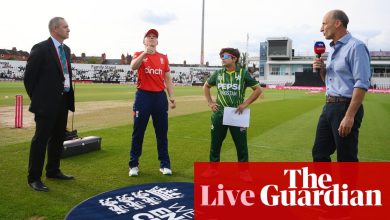‘I ain’t no fool’: Lennox Lewis on Fury-Usyk and offers of returns to boxing | Boxing

[ad_1]
Lennox Lewis pauses thoughtfully as he considers whether his achievement should become the last undisputed heavyweight champion of the world after defeating Evander Holyfield in 1999 means he must be ranked alongside greats of the past from Jack Johnson and Joe Louis to Rocky Marciano and Mohammed Ali. His answer, when it comes, is emphatic: “Yes, absolutely. I truly believe I belong in the same room as them.
Lewis, 58,’s reflections on boxing’s once glorious but now broken history feel fresh just a week after next Saturday night fight between Tyson Fury and Alexander Usyk. Unless there is a draw in Saudi Arabia, either Fury or Usyk will become the first undisputed heavyweight champion of the world this century.
Before Lewis called off an intriguing fight to be held in Riyadh and identified his likely successor, he spoke in compelling detail about his two fights with Holyfield 25 years ago. In March 1999, after outboxing Holyfield in their first unification match at Madison Square Garden, Lewis was robbed by a travesty of equality which will be subject to judicial investigation. He clearly won the rematch in Las Vegas nine months later to finally add Holyfield’s WBA, IBF and IBO titles to the WBC belt he already held.
“I felt the scale,” Lewis says as he recalls his emotions when he was fighting for the undisputed title. “I’ve never met Holyfield, but I saw this HBO documentary about him that said how great he was and was the perfect champion. I’m like, “How can you call him so great and he won’t fight me?” I wanted to prove that I was the undisputed champion, and I said, “Holyfield has never seen a fighter like me.”
Lewis recalls that before the first fight, “when I walked into the ring and saw Holyfield singing a gospel song on his way out, I thought, ‘He’s not taking me seriously.’ I wanted to show him that, ‘Yo, I’m real and he has someone in front of him who takes him very seriously. I will not sing when I go to the ring.
In the build-up, the normally calm and composed Lewis suggested that Holyfield’s seemingly devout faith could not hide his troubled personal life. Was this a way to get under his rival’s skin? “Absolutely, and it was,” Lewis says with a smile. “He admitted it.”
An angry Holyfield promised he would win by knockout in the third round. That statement, even now, makes Louis gasp in disbelief. “Ridiculous. I held my breath until this round and said to myself, “Show me what you can do.” But he actually blew it.
Lewis easily held off Holyfield’s desperate attack and, as he says, “during the fight I felt completely in control. But he actually made me a better fighter because Holyfield had more technical skills than the other heavyweights. He needed them because of his size [Holyfield had originally been a cruiserweight]. But you know how he really made me better? Because he uses his head [to butt Lewis]. There was no point in crying to the referee, so I had to make a mental shift: “Okay, this is the situation. Can you correct yourself? So I adjusted.”
He was far more skilled and powerful for most of the 12 rounds and so Lewis’ face was written in disbelief when he heard that one judge, the disgraced American Eugenia Williams, declared Holyfield the winner, while British official Larry O’Connell scored a draw. Only Stanley Christodoulou, the highly experienced South African referee, got it right and matched the consensus of almost everyone else watching the fight when he gave Louis a clear decision.
“I couldn’t believe it was a draw,” says Lewis, “when the stroke count was so overwhelmingly in my favor. I threw and landed so many more punches. I was mad and I said to my manager at the time, Frank Maloney, ‘Yo, they didn’t put it together right. Go check it out. There is an error. I was in shock. But you know what snapped me out of my shock? The fact that everyone was saying, “You won the battle.” All I wanted was for everyone to see that I was a better fighter and that I was the real heavyweight champion of the world.”
The result was such a scandal that Williams was eventually brought before a federal grand jury to answer questions about her ties to Holyfield’s promoter, Don King.
I was in Las Vegas for rematch in November 1999 and remember how battered and sad Holyfield looked after Lewis pulled out a unanimous points victory. Lewis’s pride, despite everything, can still be heard in his voice today: “I went through hills and valleys and holes and actually got to the top of the mountain. It wasn’t easy as I had to do it twice and before that they tried to keep me away by not fighting me or blocking me. There were barriers to stop me from becoming the undisputed heavyweight champion of the world.”
Almost 25 years later and with his status as the last great heavyweight boxer sealed, it’s timely to hear Lewis’ assessment of the upcoming Fury vs. Usyk fight in Riyadh. “You’re looking at two very good, very determined fighters, guys who have never lost [a professional bout]. We will see, May 18, who is the best in this era.”
Lewis is adamant about his choice of Fury. “I believe the bigger man, the better man, wins. Both have good skills and Usyk has good movement, with good balance and combines his shots well. But he’s up against a 6ft 9in guy and for me, Tyson Fury is very elusive, even if it is this big. If he makes you miss, he makes you pay.
“It’s an interesting fight, but I always say that if two people have the same technical skills, the bigger fighter wins because he can impose his size on the other. It has happened before when the smaller man wins, but in this case, Tyson Fury has many different weapons in his arsenal. He has shown in [three] fight Deontay Wilder, he’s aggressive and moves forward well. These fights really showed his skills, his talent, his generalship in the ring. I’d put money on Fury – as long as it’s 100% focused Fury.”
In his last, near-catastrophic battle more than six months ago, Fury was crushed and almost lost to Francis Ngannou, the former Ultimate Fighting Championship heavyweight titleholder making his boxing debut. “If it was me against Ngannou,” Lewis offers, “I would go there and show that boxing is very different from the UFC. Fury had to go after him and knock him out. Anthony Joshua did that a few months later.
“But Fury wasn’t at his best. He was very overweight and did not take the fight seriously. Joshua showed that boxing is different. He hit Ngannou with a very good right hand and it didn’t look good the way it landed. It’s a dangerous sport that we don’t play.”
after the promotion of the newsletter
Would Fury at his best put Lewis to a demanding test? “Yes, because of its size. I’ve been watching him for a long time and he’s a good boxer. He is the one who deals with shadows the most out of all of them. You can tell.”
What would his strategy be against Fury if they met in Louis’ prime? “That’s an interesting and really good question. But I’m a fighter specialist and I don’t want to tell people how I would do it. I don’t want anyone using my information without me.”
Is Louis convinced he could have beaten Fury? “Absolutely. Everyone has a flaw – you just have to find it. Holyfield was very effective when he boxed me because he made me spin. It set me back a few times, but I found a way.
He and Holyfield defeated Mike Tyson, but Lewis is adamant he will support his old rival in July when the then 58-year-old Tyson fights YouTuber Jake Paul in a dubious but officially sanctioned bout that would receive massive publicity. “Absolutely, absolutely,” Lewis says, echoing Tyson’s endorsement. “I’m looking forward to it because you have to look at these guys as entertainers. Audiences love them and want to see them in action.”
But knowing the damage boxing can do, is Lewis concerned about the safety of a man approaching 60 and new to boxing? “I’m worried about Jake Paul,” Lewis says. “Tyson still knows how to hit, as you can see when he hits a bag. If Jake Paul gets hit by one of these shots, he’ll feel it. I know Jake Paul doesn’t want to get hit.
“Tyson comes forward and knows how to cut the ring. It could be a matter of time as how good is Jake Paul’s defense? I saw Mike a few weeks ago and he looked fine. He was walking around shirtless and showing off his body, so he’s getting ready.
Are they still trying to get Lewis back in the ring? “Yes, they do. But, as my friend says, I’m not a fool. Hopefully that means ditching any comeback gimmick for an undisputed champion as significant as Lewis? He is laughing. “I was seeing if I could catch you there. To me, money talks, nonsense walks.” Does that mean he would consider an astronomical return offer? “That’s what I’m saying. I would 100% consider it.”
Lewis still smiles when I ask him if he works out regularly. “To understand. I ran five miles this morning, swam a few lengths, 100 meters. Then I woke up and took a shower.”
We laugh at his joke and agree that it is far more important that he became one of only three World Heavyweight Champions to retire while holding the title. Before him were Gene Tunney and Rocky Marciano. “It meant a lot to me because setting goals and achieving results is a big thing. When Manny [his last trainer, Emanuel Steward] told me to take this last fight against Vitali Klitschko, he said, “You will beat him and be known as the greatest in this age and the next.” I’m like, “I’ll take it. I am now the undisputed champion. What is higher than that? I thought it was a good challenge for me.
“Muhammad Ali was my hero and people always asked, ‘Why do you think he stayed in boxing too long?’I looked at the aspect of why are all these champions coming back? For me, the answer was money. I can understand because everyone you meet [in retirement] says, “Hey, champ! When are you getting back in the ring?’ I’m like, “Hey, dude. I graduated 20 years ago.”
Louis smiles one last time, his wisdom as evident as his amusement. “As my friend in show business says,” he murmurs, “I’ve decided to retire and leave them wanting more.”
[ad_2]




